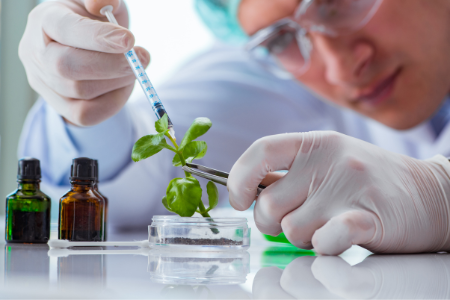From the basic science of excellence in plant biology to biotechnological applications in crops with products that are already inserted in the international market, are the thematic focuses of the “Advanced course in applications of plant biology to the fruit and vegetable and forestry industry”, which during July finished its second version.
 “This course will continue to be taught in the first quarter of the next few years. My philosophy was and is to leave it open to the community of plant biologists and biotechnologists in Latin America at no cost”, explains Dr. Estevez, organizer of the course and Associate Researcher at the Millennium Institute for Integrative Biology (iBio).
“This course will continue to be taught in the first quarter of the next few years. My philosophy was and is to leave it open to the community of plant biologists and biotechnologists in Latin America at no cost”, explains Dr. Estevez, organizer of the course and Associate Researcher at the Millennium Institute for Integrative Biology (iBio).
This course is part of the activities proposed by the researcher within the framework of the Doctorate in Biotechnology at Universidad Andrés Bello. Estevez thanked the academics and researchers for their participation, a total of 14 in this version. The course was divided into three modules, the first was the bases of plant biotechnology: from basic science to potential applications in fruit species; then the second module was plant biotechnology and fruit species; and the last one dealt with Biotechnological developments in plants.
Regarding the course, the academic from the Andrés Bello University highlights that it is the only one of its kind in Latin America, either because of the diversity of topics it covers, and because of the quality of the professors and researchers who participate. “It clearly represents a demand in an area of thematic vacancy that until now had not been covered”, says the doctor in Biological Sciences.
“An important part of the results is that students can understand that for any serious biotechnological development, first there needs to be a base of science and basic knowledge of excellence. Without that, it is impossible to develop anything of quality locally in Chile or for the international market. It is also important to understand that, in this context of global climate change, quality scientific research and the development of human capital of plant biotechnologists are very necessary to face the challenges that are being raised, how to continue producing food in this context of drought events, extreme heat, for example”, explained the iBio researcher.
The course concluded with the presentation of the participating students. It was about vegetable biotechnological projects applying what they reviewed during the course sessions. “It is key that students in the various doctoral programs of Chilean Universities have the opportunity to be exposed to, interact with, and be influenced by top-level specialists in each of the course topics,” said the organizer, who also said that in In this instance, the notable progress is observed from the first classes to the end of the course.
“It is important to note that students may have the opportunity to maintain close contact with all the teachers involved in the course once the course is over. I think that has a very positive effect on their own doctorates in progress.
 “Finally, I would like to thank the Universidad Andrés Bello, the Millennium Institute for Integrative Biology (iBio) and the Millennium Nucleus for the Development of Super Adaptable Plants (MN-SAP) for their constant support of my teaching and scientific research work,” he concluded. Dr. Estevez.
“Finally, I would like to thank the Universidad Andrés Bello, the Millennium Institute for Integrative Biology (iBio) and the Millennium Nucleus for the Development of Super Adaptable Plants (MN-SAP) for their constant support of my teaching and scientific research work,” he concluded. Dr. Estevez.
It should be recognized that the course “Advanced course in applications of plant biology to the fruit and vegetable and forestry industry” was made possible thanks to the participation of Susana Saez (UNAB), Elena Vidal (U. Mayor – iBio), Francisca Blanco (UNAB – iBio), Claudio Meneses (UNAB), Gabriela Amodeo (BBE-UBA), Lorena Norambuena (U. of Chile), Fabiana Drincovich (U. of Chile), Reinaldo Campos-Vargas (U. of Chile), Carlos Figueroa ( U. Talca), Fernando Carrari (IFIBYNE-UBA), Simón Ruiz (U. Talca) and Raquel Chan (IAL).













![[Img #74683]](https://thelatestnews.world/wp-content/uploads/2024/12/The-main-mistakes-to-avoid-when-betting-on-electronic-sports-300x200.jpg)
Add Comment